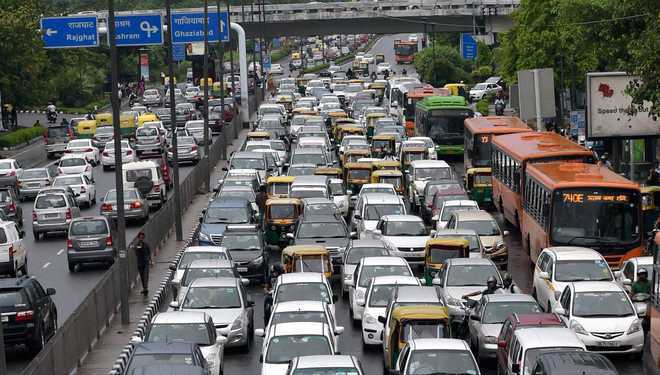
The projected population size of New Delhi in 2028 is about 37.2 million, surpassing Tokyo’s 36.8 million, it added. PTI file
United Nations, May 16
Delhi is projected to become the most populous city in the world around 2028, according to new United Nations estimates released here on Wednesday, which said India is expected to add the largest number of urban dwellers by 2050.
The 2018 Revision of World Urbanisation Prospects produced by the Population Division of the UN Department of Economic and Social Affairs (UN DESA) and released here today said that 68 per cent of the world population is projected to live in urban areas by 2050.
Currently, 55 per cent of the world’s population lives in urban areas.
The report notes that future increases in the size of the world’s urban population are expected to be highly concentrated in just a few countries.
Together, India, China and Nigeria will account for 35 per cent of the projected growth of the world’s urban population between 2018 and 2050. By 2050, it is projected that India will have added 416 million urban dwellers, China 255 million and Nigeria 189 million.
Tokyo is the world’s largest city with an agglomeration of 37 million inhabitants, followed by New Delhi with 29 million, Shanghai with 26 million, and Mexico City and São Paulo, each with around 22 million inhabitants. Cairo, Mumbai, Beijing and Dhaka all have close to 20 million inhabitants.
“By 2020, Tokyo’s population is projected to begin to decline, while Delhi is projected to continue growing and to become the most populous city in the world around 2028,” the report said.
The projected population size of New Delhi in 2028 is about 37.2 million, surpassing Tokyo’s 36.8 million, it added.
By 2030, the world is projected to have 43 megacities with more than 10 million inhabitants, most of them in developing regions. However, some of the fastest-growing urban agglomerations are cities with fewer than a million inhabitants, many of them located in Asia and Africa.
Projections show that urbanisation, the gradual shift in residence of the human population from rural to urban areas, combined with the overall growth of the world’s population could add another 2.5 billion people to urban areas by 2050, with close to 90 per cent of this increase taking place in Asia and Africa, according to the new United Nations data set launched today.
The urban population of the world has grown rapidly from 751 million in 1950 to 4.2 billion in 2018. Asia, despite its relatively lower level of urbanization, is home to 54 per cent of the world’s urban population, followed by Europe and Africa with 13 per cent each.
Today, the most urbanized regions include Northern America (with 82 per cent of its population living in urban areas in 2018), Latin America and the Caribbean (81 per cent), Europe (74 per cent) and Oceania (68 per cent). The level of urbanization in Asia is now approximating 50 per cent. In contrast, Africa remains mostly rural, with 43 per cent of its population living in urban areas.
Some cities have experienced population decline in recent years. Most of these are located in the low-fertility countries of Asia and Europe where overall population sizes are stagnant or declining.
“Economic contraction and natural disasters have also contributed to population losses in some cities,” the report said.
Globally, fewer cities are projected to see their populations decline from today until 2030, compared to what has occurred during the last two decades.
The rural population of the world has grown slowly since 1950 and is expected to reach its peak in a few years. The global rural population is now close to 3.4 billion and is expected to rise slightly and then decline to 3.1 billion by 2050. Africa and Asia are home to nearly 90 per cent of the world’s rural population in 2018.
India has the largest rural population (893 million), followed by China (578 million).
The report added that understanding the key trends in urbanization likely to unfold over the coming years is crucial to the implementation of the 2030 Agenda for Sustainable Development, including efforts to forge a new framework of urban development.
As the world continues to urbanize, sustainable development depends increasingly on the successful management of urban growth, especially in low-income and lower-middle-income countries where the pace of urbanization is projected to be the fastest.
“Many countries will face challenges in meeting the needs of their growing urban populations, including for housing, transportation, energy systems and other infrastructure, as well as for employment and basic services such as education and health care. Integrated policies to improve the lives of both urban and rural dwellers are needed, while strengthening the linkages between urban and rural areas, building on their existing economic, social and environmental ties,” it said. PTI



























